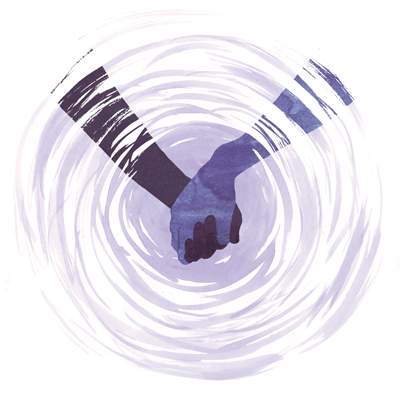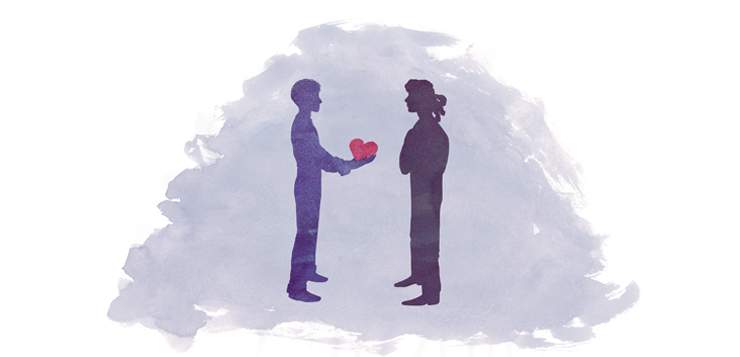Compassion is the feeling that naturally arises when you learn of the suffering of another, and that motivates you to want to do something to help. Far from being just a social nicety, compassion has a great evolutionary purpose: Human offspring are the most dependent and vulnerable of any species, and need the most care from others to survive. This total dependence is why Charles Darwin said that sympathy is humanity’s strongest instinct. Simply put: Without compassion we wouldn’t survive.
If you find yourself feeling less moved than you’d like—or maybe your empathy muscle has grown a bit weak from lack of use—here are some ways to strengthen it. You, and every other living creature, will benefit from the results.
1. See Beneath the Rough Exterior
When someone acts unpleasantly or is just generally difficult, it’s hard to feel compassion for them. But there’s almost always a reason for such behavior. If we can pause and try to recognize this, our heart can soften and create an opening for the possibility of greater connection and healing. Is there a “tough personality” in your life that you can try to see in a different light?
2. Create Ripple Effects
Turns out, kindness and generosity are contagious. A 2010 study discovered that when we witness generosity, it inspires us to be more generous. In fact, researchers found that the ripple effect of this kindness spreads by three degrees. Acting compassionately does the same thing. Where can you pay it forward today?
3. One Thing a Day
Look around and notice who in your life is having a difficult time and could use some support. The gesture can be big, such as bringing a meal to the infirm, or relatively small, such as sending an email or note to let someone know you’re thinking of them. Begin the practice of doing one thing each day for someone else.

4. Try Understanding
So often our disconnection from one another stems from a lack of understanding. Yet striving to understand where a person is coming from naturally elicits feelings of compassion and connection. This doesn’t excuse bad behavior, but it does give us perspective and help us to not take things so personally.
5. Practice Gratitude
Most of us have been the recipient of kind and compassionate gestures at some point in our lives—an introduction that led to a new job; a compliment or kind word at just the right moment; an unexpected gift. Take a few moments to recall one of these experiences and see if you can tap into the gratitude you felt at the time, and maybe still do.
6. Be Kind to Yourself
Sometimes it’s easier to feel compassionate for another than for yourself. But true compassion doesn’t discriminate. The next time you’re having a difficult moment, see if you can offer yourself some kindness. You might be surprised at how much it helps—and helps you to feel kinder toward others.
7. Celebrate Imperfection
One of the most corrosive sources of self-criticism comes from believing we need to be “perfect.” Far from making us “better,” this attitude can cause us to spiral into obsessive thinking, anxiety, and depression. Try this instead: If you make a mistake or aren’t perfect at something, lift your arms and yell “Hooray” or “Woo-hoo!” Taking a more playful approach to life is a great act of self-compassion, as it trains your brain to let go, learn from mistakes, and, simply, to begin again.
8. Just What the Doctor Ordered
Research shows that feeling compassion is good for us. It causes our heart rate to slow, which makes us more relaxed and calm; it leads to the release of the “bonding hormone” oxytocin, which helps us to feel more connected and loving toward others; and it activates regions of the brain linked to empathy, caregiving, and pleasure.
9. Reach Out and Touch Someone
In 2006 James Coan, psychologist and researcher at the University of Virginia, found that holding the hand of a loved one significantly reduces the brain’s reactivity to electric shocks. When a loved one is struggling, see if it’s OK to give a hug or to hold their hand. If you’re the one struggling, notice what happens when you place your hands on your heart or stomach.
10. Happier Genes
Researchers have discovered that people who actively practice compassion and altruism have lower levels of inflammatory gene expression and higher expression of antiviral and antibody genes than people who lived for greater self-gratification or pleasure. “Doing good” and “feeling good” may be different things, but through “doing good” you can have both.
11. Meet Your Self-Critic
You probably run the same self-defeating stories, the same criticisms over and over again. Make a “Top 10 Hit List” of self-critical thoughts. As you notice them arise (as they inevitably will), acknowledge it: “Ah, there you are. I was wondering when you’d show up.” Then, take a nice deep breath, and say, “May I be free from being so hard on myself, may all people be free from being so hard on themselves, may we all live with ease.”
A Box of Simple Advice
Turn Values Into Verbs
When asked what they value most in the world, people will often say things like “peace,” “compassion,” or “connection.” But in order to make this real we have to turn these values into verbs, making them more specific and practical. If you value compassion, what does that look like daily? Take out a piece of paper, write “Compassion” at the top and create a list of actions, small to big, that you can start doing immediately. This is how we live Gandhi’s words: “Be the change that you wish to see in the world.”







